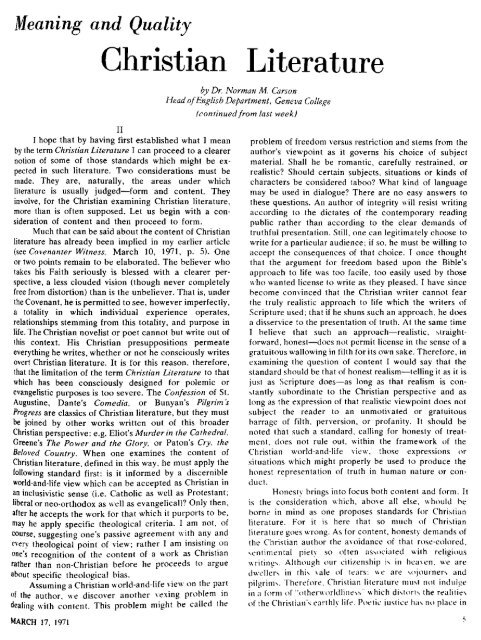Covenanter Witness Vol. 86 - Rparchives.org
Covenanter Witness Vol. 86 - Rparchives.org
Covenanter Witness Vol. 86 - Rparchives.org
You also want an ePaper? Increase the reach of your titles
YUMPU automatically turns print PDFs into web optimized ePapers that Google loves.
Meaning and QualityChristian Literatureby Dr. Norman M. CarsonHead of English Department, Geneva College(continued from last week)III hope that by having first established what I meanby the term Christian Literature I can proceed to a clearernotion of some of those standards which might be expectedin such literature. Two considerations must bemade. They are, naturally, the areas under whichliterature is usually judged—form and content. Theyinvolve, for the Christian examining Christian literature,more than is often supposed. Let us begin with a considerationof content and then proceed to form.Much that can be said about the content of Christianliterature has already been implied in my earlier article(see <strong>Covenanter</strong> <strong>Witness</strong>, March 10, 1971, p. 5). Oneor two points remain to be elaborated. The believer whotakes his Faith seriously is blessed with a clearer perspective,a less clouded vision (though never completelyfree from distortion) than is the unbeliever. That is, underthe Covenant, he is permitted to see, however imperfectly,a totality in which individual experience operates,relationships stemming from this totality, and purpose inlife. The Christian novelist or poet cannot but write out ofthis context. His Christian presuppositions permeateeverything he writes, whether or not he consciously writesovert Christian literature. It is for this reason, therefore,that the limitation of the term Christian Literature to thatwhich has been consciously designed for polemic orevangelistic purposes is too severe. The Confession of St.Augustine, Dante's Comedia, or Bunyan's Pilgrim'sProgress are classics of Christian literature, but they mustbe joined by other works written out of this broaderChristian perspective: e.g. Eliot's Murder in the Cathedral,Greene's The Power and the Glory, or Paton's Cry. theBeloved Country. When one examines the content ofChristian literature, defined in this way, he must apply thefollowing standard first: is it informed by a discernibleworld-and-life view which can be accepted as Christian inan inclusivistic sense (i.e. Catholic as well as Protestant;liberal or neo-orthodox as well as evangelical)? Only then,after he accepts the work for that which it purports to be,may he apply specific theological criteria. I am not, ofcourse, suggesting one's passive agreement with any andevery theological point of view; rather I am insisting onone's recognition of the content of a work as Christianrather than non-Christian before he proceeds to argueabout specific theological bias.Assuming a Christian world-and-life view on the part°f the author, we discover another vexing problem indealing with content. This problem might be called theproblem of freedom versus restriction and stems from theauthor's viewpoint as it governs his choice of subjectmaterial. Shall he be romantic, carefully restrained, orrealistic? Should certain subjects, situations or kinds ofcharacters be considered taboo? What kind of languagemay be used in dialogue? There are no easy answers tothese questions. An author of integrity will resist writingaccording to the dictates of the contemporary readingpublic rather than according to the clear demands oftruthful presentation. Still, one can legitimately choose towrite for a particular audience; if so, he must be willing toaccept the consequences of that choice. I once thoughtthat the argument for freedom based upon the Bible'sapproach to life was too facile, too easily used by thosewho wanted license to write as they pleased. I have sincebecome convinced that the Christian writer cannot fearthe truly realistic approach to life which the writers ofScripture used; that if he shuns such an approach, he doesa disservice to the presentation of truth. At the same timeI believe that such an approach—realistic, straightforward,honest—does not permit license in the sense of agratuitous wallowing in filth for its own sake. Therefore, inexamining the question of content I would say that thestandard should be that of honest realism—tellingit asit isjust as Scripture does—as long as that realism is constantlysubordinate to the Christian perspective and aslong as the expression of that realistic viewpoint does notsubject the reader to an unmotivated or gratuitousbarrage of filth, perversion, or profanity. It should benoted that such a standard, calling for honesty of treatment,does not rule out, within the framework of theChristian world-and-life view, those expressions orsituations which might properly be used to produce thehonest representation of truth in human nature or conduct.Honesty brings into focus both content and form. Itis the consideration which, above all else, whould beborne in mind as one proposes standards for Christianliterature. For it is here that so much of Christianliterature goes wrong. As for content, honesty demands ofthe Christian author the avoidance of that rose-colored,sentimental piety so often associated with religiouswritings. Although our citizenship is in hea\en, we aredwellers in this \ale of tears; we are sojourners andpilgrims. Therefore, Christian literature must not indulgein a form of "otherworldliness" which distorts the realitiesoi the Christian's earthly life. Poetic justice has no place inMARCH 17, 1971 s
















